Experiencing unparalleled international networking opportunities, world-class academic discussions, interactive panels with select executives, practical hands-on learning opportunities and visits to leading US and Chinese companies, an exclusive group of next-generation global business leaders completed the inaugural 2015 iLEAD program’s 10-day US Module on earlier this month.
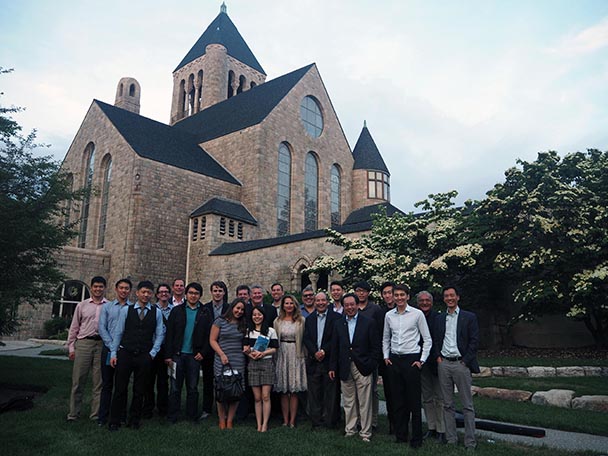
The iLEAD group poses for a picture at the Pitcairn family’s estate outside of Philadelphia on the first day of the US Module.
A collaboration between CKGSB, Cornell University, US China Partners Inc. and Next Opportunity Group, the iLEAD executive education program is the only one of its kind that prepares both US and Chinese legacy family leaders as well as other first-generation entrepreneurs for future global success through networking and collaborative learning, with modules in both the US and China.
iLEAD’s overall learning objectives are to help next-generation global business leaders:
The US Module featured four days in the Philadelphia region before moving on to New York City. Participants will travel to Beijing and Shanghai during the upcoming China Module in Beijing from July 12-22. Select spots remain for the China Module – contact Alan Chen at 646-627-7735 or alanchen@ckgsb.edu.cn today or Daniel G. Van Der Vliet at 607-255-2881 or Daniel.vdv@cornell.edu.
Among the highlights of this multi-faceted deep dive in the US:
Panel Discussions with Select Executives and Academics
Participants were privileged to engage in several high-level discussions with top-level American CEOs and senior executives.
Continuing a Family’s Legacy
Objective: To learn best practices for legacy families to sustain and grow through the generations. What defines a legacy family versus a non-legacy family? What core principals can be learned from studying successful, long-running family businesses? What missteps should be avoided? What is a family council and what are the best practices for operating one?
Participants:
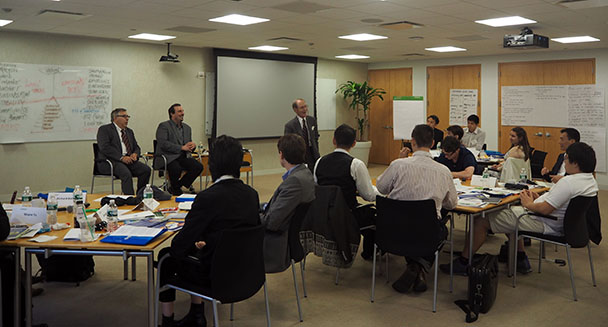
Dennis Jaffe, left, Andrew Pitcairn and E. Paul du Pont III lead an iLEAD panel discussion on “Continuing a Family’s Legacy” at CKGSB’s New York office.
Jaffe began by sharing insights from his research into more than 70 100-year-old legacy families on the reasons behind their longevity. He offered best practices for multigenerational family enterprises and shared the seven qualities he sees most frequently among this uniquely successful group.
Du Pont and Pitcairn both shared their family histories and reflected on their respective paths through the generations. Du Pont stressed the importance of adaptability, sharing how the family business started out making gunpowder but evolved over time to become the chemical company we know today. He also shared his thoughts on the Du Pont family’s missteps, stating, “We have the appearance of a legacy family, but we’re really a bunch of legacy individuals.”
Pitcairn discussed the essential role of a family office that began in 1923. He also reflected on the success of the Pitcairn Family Council, stressing the importance of communication across the generations.
The panel then fielded questions from the iLEAD group, including how they define who is considered a family member and what first-generation families must do to build a legacy culture.
Entrepreneurship View of Legacy Family
Objective: To learn the key factors first-generation entrepreneurs must consider as they prepare to pass the baton to the next generation. Is the next generation capable and willing to lead? If so, what steps should I take to start a family office and begin sharing the business with my children? If not, what does selling a company look like? In either case, how do I structure my estate to take care of my children and future generations?
Participants:
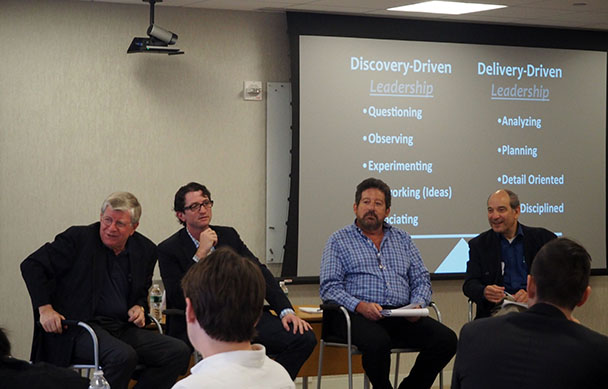
Peter Cuneo, left, Colin Cuneo and Al Berg with moderator Jeremiah Schnee partake in an iLEAD panel discussion on “Entrepreneurship View of Family Legacy” at CKGSB’s New York office.
Reflecting on the influences that shaped him as a businessman, Peter Cuneo spoke candidly about the values his parents instilled in him and his experiences in the US Navy during the Vietnam War. He shared his thoughts on the unique skills required to turn companies around. He discussed why he is now focused on his family office. “I work for my sons and my six grandchildren now.”
Colin talked about the working relationships he has established with his father and brother, sharing how each of their unique strengths allows them to tackle different pieces of the business.
Berg talked about the considerations he made when deciding to sell his business rather than pass it on to his two children. He also shared the details of how he has structured his family’s estate to provide for his two children, his wife and future generations.
The panel fielded many questions, on topics ranging from estate planning and startups to targeting companies in need of turnarounds.
The Value of Giving
Objective: To explore the role of philanthropy in a family business. Why is philanthropy important? What are the key cultural differences between the US and China with regards to charitable giving? What should next-generation leaders consider when deciding how to involve their families in giving? What are the different forms of philanthropy and how can one decide which path is best?
Participants:
Ho shared an overview of philanthropy both in the US, home to 86,000 foundations as of 2012, and in China, where giving is less institutionally established and only 4,400 foundations are in operation. For leaders inheriting family businesses, he addressed the importance that giving can play in keeping families connected across generations.
Houston spoke to Robin Hood’s mission of fighting poverty in New York City as being absolutely critical to the foundation’s success. She also described the metrics with which they evaluate the social impact of their various efforts. “Data in combination with your heart is how you can make the best possible investment” of your philanthropic dollars,” Houston said.
Marker detailed the three levels of philanthropy: 1.“feelgood” or compassionate; 2. strategic; 3. systemic. He noted that there is a current trend to fund systemic efforts over the other two, but Marker cautioned, “There’s a place for all three levels of philanthropy.”
Visits to Leading American and Chinese Companies
The iLEAD group took many visits to American and Chinese companies and start-ups with significant global impact, interacting with top executives along the way. An overview of some key visits:
Haier America
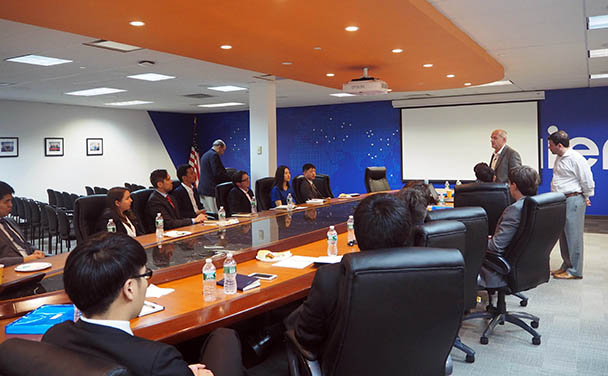
Haier America President and CEO Adrian Micu speaks to the iLEAD group during a company visit to Haier America’s headquarters in Wayne, NJ.
Micu spent more than 90 minutes offering key insights into Haier America’s strategic plans for growing their share of the American marketplace, from establishing a unified vision to preparing a complete marketing campaign and revamped product line ready to roll out later this year. He fielded many questions from the group regarding niche markets, recruiting competitive talent, cultural differences between Chinese and US consumers, and Haier’s approach to acquiring other companies.
Bloomberg, L.P.
Going behind the scenes at Bloomberg’s impressive headquarters, Zeleniuch took the group through the company’s carefully-designed interior. “Spaces are open and transparent to mirror the openness and transparency of data,” Zeleniuch said. The group toured the company’s news and media floor, which employs 2,300 journalists. The floor also houses Bloomberg’s TV and Radio operations, and Charlie Rose films onsite. An exhibit showcases the evolution of the Bloomberg Terminal, which currently has 320,000 unique licenses in operation worldwide.
Nasdaq
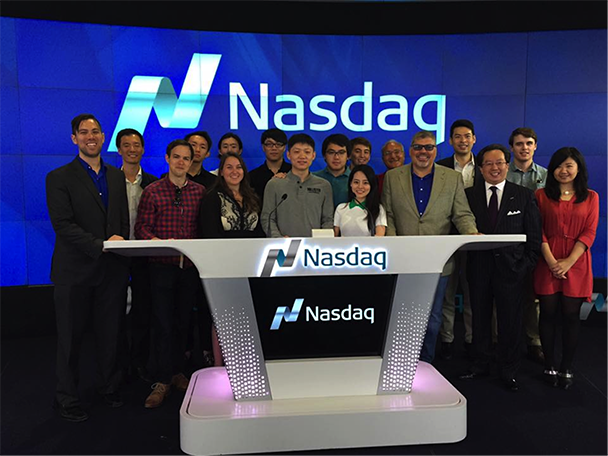
iLEAD participants had the thrill of witnessing the day’s closing bell ceremony at the Nasdaq during an exclusive tour of the company’s headquarters in the heart of New York City’s Times Square.
This exclusive tour took the group onto the floor of Nasdaq’s television broadcasting studio. Our tour guides offered insights on competition for IPOs between the Nasdaq and NYSE, as well as the process for Chinese companies going public. The tour concluded with the thrill of witnessing the day’s closing bell ceremony.
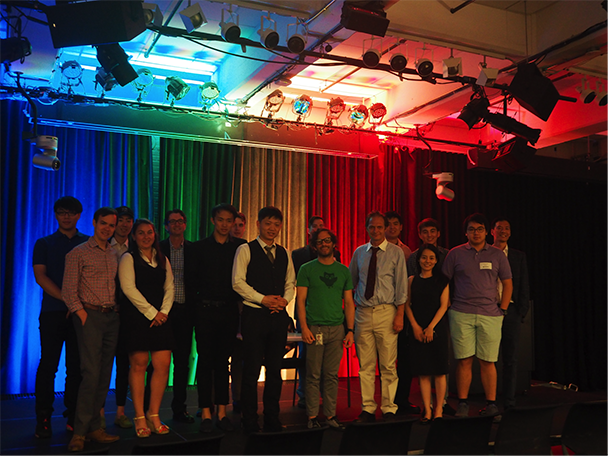
The iLEAD group on a stage lit with Google’s iconic colors during an exclusive tour inside the company’s New York City office.
iLEAD participants had the exclusive opportunity to tour Google’s New York City offices, though the company asked that the contents of the tour not be shared with the public.
Experiential Learning
Capping off 10 days of rigorous study as a team, the iLEAD participants took part in a unique Pit Crew Challenge experiential activity. They assumed the roles of a team charged with prepping a race car for victory. Through this metaphorical task, the iLEAD crew sharpened their communication skills and experienced the advantages and challenges of collaboration in an interdependent team.
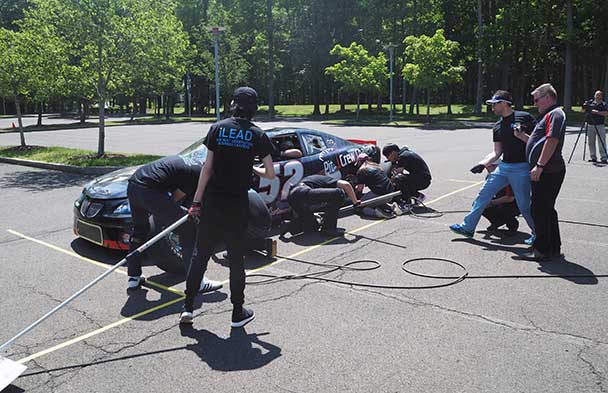
iLEAD participants take part in a hands-on Pit Crew Challenge.
The iLEAD group also bonded and created their own network as a peer group of next-generation leaders during cultural activities ranging from seeing “Something Rotten” on Broadway, to touring the Pitcairn family’s impressive Glencairn estate, to attending a Yankees baseball game.
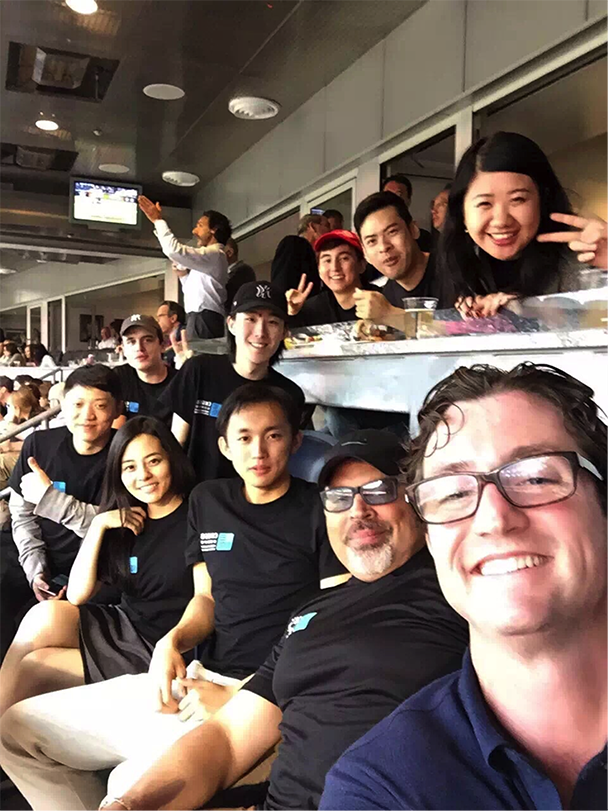
iLEAD participants and staff unwind and celebrate the end of the US Module while attending a Yankees game in New York City.
Rounded out with daily engaging lectures on core topics by academics from CKGSB, Cornell, MIT, Wharton and more, the US Module was a powerful tool for growth and preparation for future success. The China Module awaits in Beijing from July 12-22 with its own range of visceral, memorable learning situations.
To learn more about iLEAD, visit the iLEAD website, contact Alan Chen at 646-627-7735 or alanchen@ckgsb.edu.cn, or contact Daniel G. Van Der Vliet at 607-255-2881 or Daniel.vdv@cornell.edu.